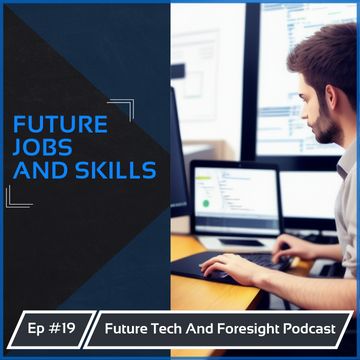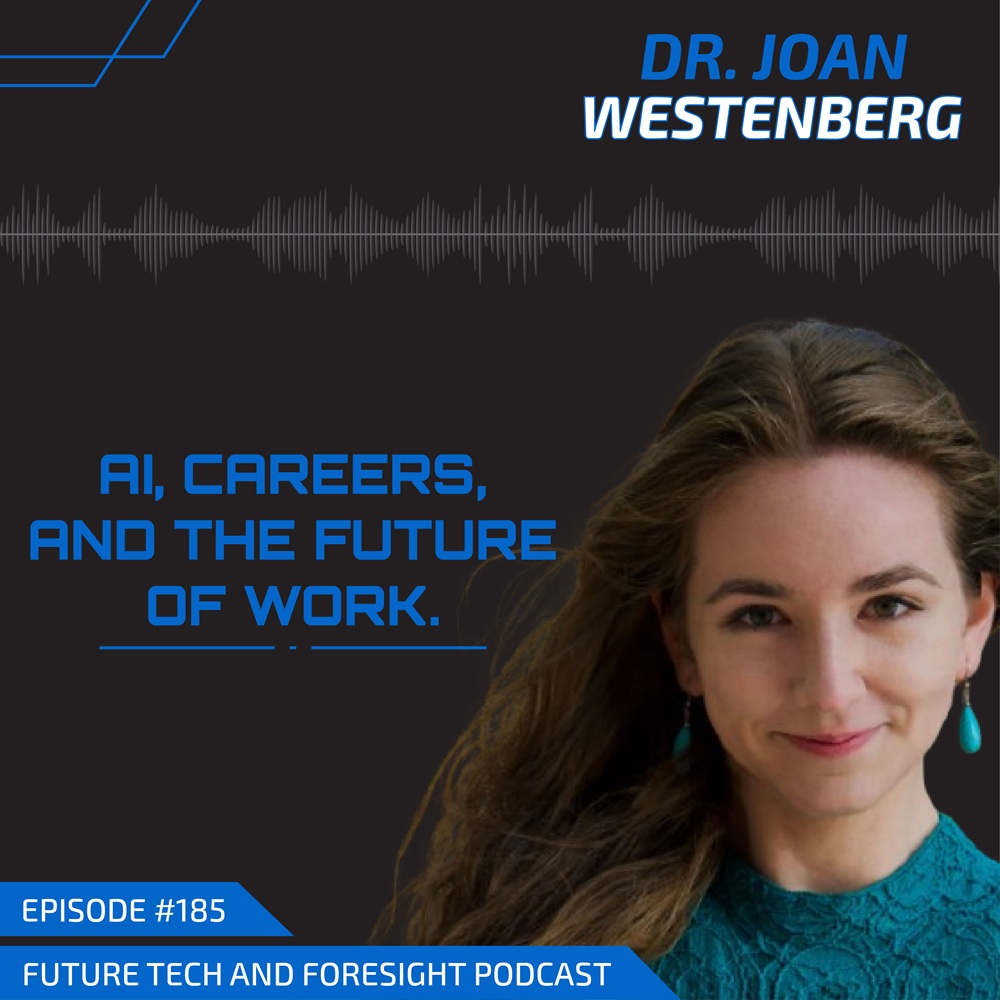About The Episode
This week we tackle the second perspective in that jobs will continue to be created and what the required skills will look like, or better known as creative destruction.
Transcript
New tech update
Okay two quick things that came up this week that I wanted to mention before jumping into the episode. The first has to do with mapping the sea! Roughly 80% of the global ocean floor is still entirely unknown or has not been measured in a modern manner. Now, international maritime and scientific communities are grouping together to map the entire Earth’s seafloor by 2030 under the name of the GEBCO Seabed 2030 project. The Ocean Infinity company plans to build and use a fleet of robotic boats, to perform trans-oceanic journeys fitted out with an array of sensors and equipment, and their own capability to deploy tethered robots to inspect all the way down to the floor of the ocean: 6,000 meters (19,684 feet) below the surface. The boats will not only be mapping the seafloor, but they’ll “also inspect pipelines, survey bed conditions for telecoms cables and off-shore wind farms.
The second, though not directly connected to automation, is nevertheless linked to the idea of exponential technological growth. On the podcast I’ve talked before about automated transportation already being put into practice. However, I did not mention the Hyperloop technology as it is still far from being implemented. However, In Brussels — February 11, 2020 — A new milestone in hyperloop transportation was reached when European countries banded together and agreed to create a joint technical committee (JTC) called JTC 20. The goal of this committee is to establish a framework throughout Europe that ensures interoperability and high safety standards, essentially allowing an entire Hyperloop system across Europe to function smoothly. Also a network of Hyperloop research centres is already in the planning stages and is slated to begin operation in the next few years, in France, Poland, Spain, and the Netherlands. They will serve as research sites for the testing and validation of the technologies and standards coming out of JTC 20. Though the Hyperloop doesn’t inherently automate jobs, it does have the potential to render air and train and long distance vehicle transportation effectively obsolete as the vacuum tubes could transport people and goods alike across great distances at speeds faster than commercial airplanes with a significant reduction in energy costs. Though still years away this is an interesting technology to keep an eye on.
Reviewing the core idea/perspective
So to start off with I want to refer to a 2014 questionnaire by the PEW Research Centre. Here some 2000 experts in the field of technology, both those building the actual technology and businesses as well those who report on it, responded to the questions about the impact of automation technologies. Some of the experts were the Chief scientists of salesforce.com, vice president of Google, Principle researcher for Microsoft. I wanted to refer to this questionnaire as I think it really highlights the goal of these last two episodes and the podcast as a whole. So, “48% of all the experts, envision a future in which robots and digital agents have displaced significant numbers of both blue- and white-collar workers—with many expressing concern that this will lead to vast increases in income inequality, masses of people who are effectively unemployable, and breakdowns in the social order. The other half (52%) expect that technology will not displace more jobs than it creates by 2025. To be sure, this group anticipates that many jobs currently performed by humans will be substantially taken over by robots or digital agents by 2025. But they have faith that human ingenuity will create new jobs, industries, and ways to make a living, just as it has been doing since the dawn of the Industrial Revolution”. But does this 2nd group of experts have any legs to stand on?
History idea (argument for jobs constantly being made)
We know that through history Jobs and the skills required for those jobs have been changing drastically due to the technological advancements bringing about large changes. Think about the large changes that we as a species have gone through from: Hunter gatherers, agriculture, the first industrial revolution, electrification, computerization, the start of the internet, and today’s 4th industrial revolution. Each of these epochs are easily visualized as having massively different jobs and tasks and different skills attached to them. But have these shifts created more or less jobs? The net impact of new technologies on employment can be strongly positive. A 2011 study by McKinsey’s Paris office found that the Internet had destroyed 500,000 jobs in France alone in the previous 15 years—but at the same time had created 1.2 million others, a net addition of 700,000, or 2.4 jobs created for every job destroyed. Furthermore, one-third of new jobs created in the United States in the past 25 years were types that did not exist, or barely existed, in areas including IT development, hardware manufacturing, app creation, and IT systems management. The argument is quite similar anywhere you look and is based on historical fact. As mentioned during this podcast, if you follow this historical perspective, the future has new and emerging technologies constantly creating new jobs that humans will need to do. But what is predicted about how tomorrow’s jobs and skills and how they look like?
The Form that Future Jobs will Take.
There are dozens if not hundreds of reports out there looking at trends and predicting what these changes will be. I specifically looked at a number of reports (ranging from 2014 to late 2019) made by the big hitters such as: The McKinsey Global Institute, The World Economic Forum, The European Commision, The Pew Research Centre and others, links will be in the shownotes as always if you wanted to look at these more in depth. I will attempt to point out the main ideas presented with a focus on two ideas, what are going to be the main new jobs of the future, and what specific skills will be required to perform them? New jobs related to the development, maintenance and upgrading of artificial intelligence (AI) technologies and big data infrastructures are among those expected to grow significantly. Digital technology also can enable new forms of entrepreneurial activity. Workers in small businesses and self-employed occupations can benefit from higher income earning opportunities. A new category of knowledge-enabled jobs will become possible as machines embed intelligence and knowledge that less-skilled workers can access with a little training. I’ve used this podcast a number of times to illustrate a similar point. For example I am putting together a monthly e-newsletter that I hope to have ready in the next few weeks. Rather than having to design every single part of it, online tools with pre-built templates make the process significantly faster, and allows someone without any design experience to produce something with a good level of quality (I hope). Granted this is a simplistic example without any embedded intelligence but hopefully it illustrates the ‘standing on the shoulder of giants’ picture this future scenario is trying to push. One of the central themes that run through many of future job scenarios is how much emotional intelligence and human to human interaction is important in the changing environment. As the routine and mundane jobs are more and more done by automated systems this will open up the opportunity to have more human interaction than we do today, or so it is forecasted. Cognizant’s future of work reports have been quite interesting in this regard as they build this idea into a future scenario where over 40 new jobs are imagined up to around 2030. Look at the shownotes for links to the two reports that list all the jobs but some of the more interesting I’ll list here.
Augmented reality journey builder: collaborate with engineers to create the essential elements for customers to move through an AR experience.
Genetic diversity officer: construct and encourage adherence to a company wide genetic equity policy that includes genetic diversity
Data Detective: Uncover meaningful business answers and recommendations by investigating data generated by sensors, devices, biometric monitors etc.
Smart home design manager: help customers design and integrate technologies into their smart home.
With this increased digital connectivity there are also the increased hacking and security threats and thus positions around this are bound to increase in number and type.
One possible position foreseen is a Juvenile cybercrime rehabilitation counselor to help the convicted cyber criminals to redirect their online talents to ethical endeavors.
The form of future skills
This leads us to the next point regarding skills. If we assume that new jobs are continually created but also significantly changed do we currently have the skills needed to take on these new shifting roles? The OECD 2019 Future of work report, estimated that 32% of all jobs will change significantly in the future (though it was unspecified as to how far that timeframe extends to). Mckinsey estimates that globally, 375 million workers way need to switch occupations by 2030. But many adults do not have the right skills for these changes, saying that 6 out of 10 adults lack basic ICT skills or have no computer experience. This is compounded with the fact that out of all jobs that are to be done in the OECD highly skilled jobs have increased by 25% over the last 20 years. This is compounded by the fact that the jobs that are most exposed to automation appear to be those that require relatively low levels of formal education, those that do not involve relatively complex social interaction and those that involve routine manual tasks. The World Economic Forum actually highlighted a list of the top 10 skills needed in 2020 as compared to 2015. The full list will be on the website but I’ll list some of the more interesting ones here:
To sum up, those jobs growing the most by 2030 appear to be those that require higher education, intensive use of social and interpretative skills, and at least a basic knowledge of ICT.
I hope you like this initial look at what jobs will look like in the future. This topic was much richer in information than originally expected so I will definitely have to return to it by discussing it with someone who focuses on it specifically.











